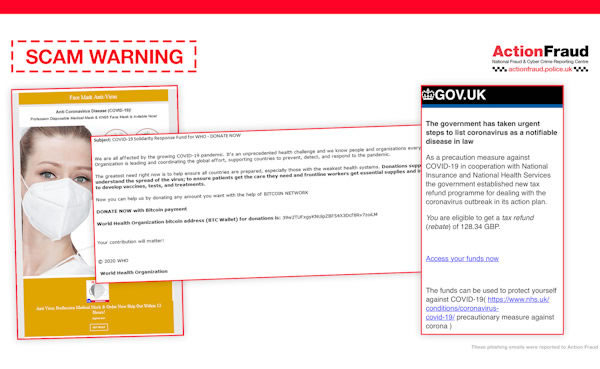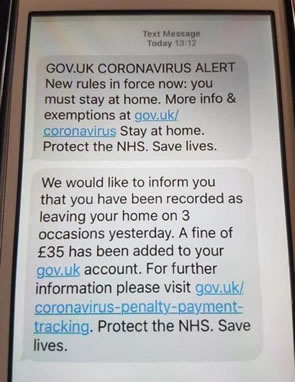Beware Covid-19 Scammers
Check before clicking on a link in an unsolicited email, text or placing an online order

Residents are being urged to stop and check before clicking on a link in an unsolicited email, or placing an online order with a new company.
Some people are exploiting the uncertainty around the Coronavirus for financial gain. Below are three examples of fraud and phishing emails that are currently being circulated.
+ Face masks that supposedly protect against COVID-19 with a direct link to 'buy' them
+ A request for a donation to the World Health Organisation (WHO)
+ A fake message from the Government which informs the recipient that they are entitled to a tax refund.
All of these are fake.
If you're in any doubt, do not click on any links in the emails or part with your money.
The newest text scam tells people they have been fined for flouting the Government’s ‘lockdown’ rules.

If people visit this link, and provide their payment details, they are revealing their bank account data and at risk of losing even more money. Another fake message appears to not only aim to trick people into revealing their bank details but to also cause alarm and distress by suggesting the Government is tracking people’s movements.
Entitled GOV.UK CORONAVIRUS ALERT - this message states: “You have exited the specified 1 mile radius on three separate occasions today. A penalty notice has been issued to your address held on the electoral roll. More info & appeals can be found at gov.uk/cvpenalty. Stay at home. Protect the NHS. Save lives.”
To best protect yourself from phishing emails, make sure you:
+
Check the actual email address of the sender. The name of the sender can be different to the email address.
+ Install the latest updates on your electronic devices as this fixes any bugs and helps protect your device.
+ Install antivirus software.
+ Use an online payment option such as PayPal, which helps to protect you.
If you think you’ve fallen for a scam, report it to your bank immediately and report it to Action Fraud. You can do this via their website or by calling them on 0300 123 2040.
Family and friends may not know about these scams, so please pick up the phone, give them a call and let them know.
Ealing Council say they are working closely with national government and local and voluntary organisations and are particularly concerned with supporting vulnerable residents in the coming days and weeks, including from scams.
Councillor Joanna Camadoo-Rothwell, lead member for community safety and inclusion said
''At this time of uncertainty and crisis, I want to assure the people of Ealing that the council is doing all we can to keep you safe.
“We are advising residents and business owners to beware of donation fraud or online scams that might target you, and those who are the most vulnerable or isolated in our communities. False donation claims asking you to input your personal details, including bank details, to receive Covid-19 relief or funds are a scam, the government, NHS, Public Health England and the council are not asking for this information and do not require it. So, if you are asked, please do not hand your details over.''
Read more here
March 30, 2020
Related links
|